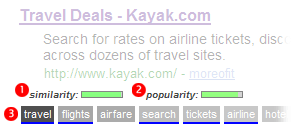You're looking for other sites like :
|
|
This document is an up-to-date specification of all metadata terms maintained by ... Initiative, including properties, vocabulary encoding schemes, syntax ...
http://dublincore.org/documents/dcmi-terms/
popularity:
metadata
dublincore
reference
standards
rdf
semanticweb
dc
specification
dublin_core
xml
|
new
search by a custom tag signature
|
|
It is the product of experience with working code since 2000, and much discussion in ... It may be put into W3C note form, or even Recommendation track form, ...
similarity:
popularity:
rdf
n3
semanticweb
w3c
metadata
web
xml
ontology
semantic
syntax
|
|
|
Develops and promotes interoperability standards and metadata for the exchange of scholarly content. Includes information about Dublin Core, IEEE LOM, and OAI-PMH metadata standards.
similarity:
popularity:
metadata
oai
openaccess
standards
archive
library
open_access
archives
opensource
search
|
|
|
Kowari Project Home ... Kowari is written in Java and licensed under the Mozilla Public License. Kowari supports Resource Description Framework (RDF) and Web ...
similarity:
popularity:
rdf
java
database
semanticweb
metadata
opensource
owl
software
ontology
kowari
|
|
|
Independent consortium of people and groups interested in developing the applicability of the Topic Maps Paradigm to the World Wide Web by leveraging the XML ...
similarity:
popularity:
topicmaps
xml
metadata
ontology
standards
xtm
topic_maps
semanticweb
maps
semantic
|
|
|
A controlled vocabulary can be useful in describing images and information when organizing and classifying content for electronic databases. Find sample hierarchies ...
similarity:
popularity:
metadata
photography
classification
taxonomy
tagging
reference
controlledvocabulary
controlled_vocabulary
database
iptc
|
|
|
A list of events, publications, and presentations, and discussions.
similarity:
popularity:
semanticweb
w3c
semantic
web
rdf
semantic_web
web2.0
xml
web3.0
reference
|
|
|
Common Tag is an open tagging format developed to make content more ... and Zigtag — offer services that help publishers get started. Retrieved from "http://commontag.org/Home" ...
similarity:
popularity:
tagging
semantic
rdfa
metadata
semanticweb
rdf
standards
folksonomy
web
ontology
|
|
|
http://www.w3.org/TR/2008/REC-rdf-sparql-query-20080115 ... W3C <eric@w3.org> ... an alternative for the IRI http://www.w3.org/1999/02/22-rdf-syntax-ns#nil. ...
similarity:
popularity:
sparql
rdf
semanticweb
w3c
query
xml
reference
semantic
web
programming
|
|
|
Common Tag is an open tagging format developed to make content more ... and Zigtag — offer services that help publishers get started. Retrieved from "http://commontag.org/Home" ...
similarity:
popularity:
tagging
semantic
rdfa
metadata
semanticweb
rdf
standards
folksonomy
web
ontology
|
|
|
APML allows users to share their own personal Attention Profile in much the same way that OPML allows the exchange of reading lists between News Readers.
similarity:
popularity:
apml
attention
xml
standards
metadata
web2.0
identity
web
social
microformats
|
Sorting Results
- This slider determines how the matched sites are sorted.
- If you want to see the most popular sites that are somewhat related to your search, slide this more towards "popularity."
- If you want to see the sites that best matched your search, regardless of popularity, slide this towards "similarity."
Must Include Tags
- Matched sites will not be shown unless they have all of the tags on this list.
- This feature is useful for when you require a site to have been tagged as something.
- To add a tag to this list, click "add tag" or click on any tag in a result.
Must Not Include Tags
- Matched sites that have any tag on this list will not be shown.
- This feature is useful for filtering out results that have tags you are absolutely not interested in.
- To add a tag to this list, click "add tag" or click on any tag in a result.
Types of Results
- This option lets you specify the types of sites to show.
- If you want to only see domains (www.
.com), select "domains only." - If you want to only see articles (www.
.com/something/here), select "articles only." - If you don't care, or care so much about both, select "Both".
About The Results
 an example search result
an example search result
How moreofit Searches
Each website has a unique tag signature -- a set of words
that users have described the website as. Moreofit searches
for websites that have similar tag signatures and displays the results.
1: Similarity
A site's "similarity" is determined by how well its tag signature matches the tag
signature that is being searched for. A 100% match means that it has the exact same
tags in the exact same order, while a 0% match means it has no tags in common.
2: Popularity
The popularity of a website is, well, pretty much self explanatory.
3: Tag Signature
The tag signatures show how a site is described. The deeper the color of the tag,
the more frequently the website is tagged as this. Tags underlined blue denote a tag
that is in common with the search's tag signature.